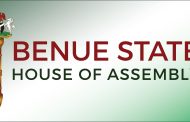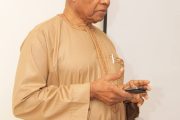“Death is not the opposite of life, but a part of it” – Haruki Murakami

The author
By Kabiru Haruna Isa, (PhD)
It was in January, 2020 when ASUU-Chairman, Bayero University, Kano (BUK) branch informed me of the ailing condition of Professor Haruna Wakili. As a good tradition of the branch, whenever any of its members is sick, members of the executive council (EXCO) will pay him or her a visit to show empathy. I was part of the ASUU team that visited Wakili just before he embarked on his medical trip to India. While in India, I, and of course my colleagues, would occasionally send him goodwill messages which, to our delight, he replied giving us hope that he was responding to treatment.
I was away in Katsina last week Monday when I received a call from my HOD, Prof Dalha Waziri, informing me of the return of Wakili to Nigeria. He also told me that there was a plan to visit him on Wednesday, at the National Hospital, Abuja. I could not resist such an opportunity, even as stressed as I was. We therefore left Kano on Wednesday, June 17th, 2020 and arrived Abuja on the same day, braving the dilapidated condition of the Kano-Abuja road and the general insecurity now associated with travel within Nigeria. When we entered his hospital room, my hope to see him in an improved condition dissipated immediately. I saw him covered on the sickbed that was to be his deathbed, he couldn’t therefore know we were there as he had gone far in the journey that turned out to be his last. Three days later, it was on a ‘dark and unforgettable Saturday’, June 20th, 2020 that I received a traumatizing call from his niece confirming my worst fear that he had died. It wasn’t unexpected, though.
Prof Wakili was my teacher and a colleague at the Department of History, BUK. My first contact with him was when I was admitted through direct entry into BUK to study for a BA in History. He was the then Acting Director before he was subsequently confirmed as the substantive Director of the Centre for Democratic Research and Training, Mambayya House (later rechristened the Mambayya House Center for Democratic Studies). The undergraduate students in our Department, especially those who were in level III, were narrating different stories about his personality, the courses he taught and his teaching methods. I registered with his course, HIS-3308 Comparative Historical Methodology, which was a core course that all students majoring in History must take. He introduced us to advanced historical methodology and the new trends of inter-disciplinarity, multi-disciplinarity and cross-disciplinarity.

History and the Historian
More importantly, he made us to appreciate, grasp, love and value scholarly pursuits, the practice of history and the historical enterprise. He made sure that his students worked assiduously and diligently to understand their subject matter and the role and relevance of history to individual, family unit, society, state formation, nation building and human development. He used history class to instill self-respect and self-pride in his students and always encouraged them to never settle for less or accept the position of inferiority in the face of parasitic commercialization and commodification of university education. I remember his intellectual and historical pontification whenever he was on the podium. He always tried to justify that history was the queen of all disciplines on the account of its centrality to all fields of study. No discipline can do without history; and any society that ignores history does so at its own peril; it is the be-all and end-all of human existence, functional operation of university education and knowledge production.
In addition to the above, and at a closer level, Professor Wakili was my BA dissertation advisor when I was in level IV. I vividly remember my first meeting with him. He appeared serious as was characteristic of him and briefed me about his personal principles and work/research ethics. One of the important issues raised that I will never forget was the need for any student of history, aspiring to become a historian, to suppress primordial sentiment and at the same time to always imbibe/symbolize intellectual honesty. There was arguably, nothing within the four walls of university that gave him pleasure like intellectual discourse, scholarly disputation, research, identification and nurturing of talents. He had the patience of sparing his precious time to respond to vexed questions of his supervisees.
In one of my subsequent encounters with him as my supervisor, I asked him to shed light on what he meant by intellectual honesty. He responded in a most exquisite and philosophical way. He explained that it was all about being truthful and sincere about the past, reporting what actually happened and acknowledging your sources as accurately as possible. He was fond of quoting Samuel Eliot Morrison thus: “no person without an inherent loyalty to truth, a high degree of intellectual honesty, and a sense of balance, can be a great or even a good historian”.
Professor Wakili was adamant and uncompromising when it came to academic standard and excellence. He always gave the best and expected nothing less in return. He persistently emphasized that his students had to conduct original research and at the same time drew their attention to the gravity of the crime of plagiarism. He was generous with his collections and lent his rare books to his students. He engaged his students and prodded them to think rationally and critically. He had passion for administration and recorded huge success as a Director of Mambayya House. This success catapulted him to the position of the Commissioner for Education in his home state of Jigawa where he midwifed the establishment of the state owned university in Kafin Hausa. After serving as a commissioner, he was subsequently appointed as the Deputy Vice Chancellor (Administration) in BUK, the position he held up to the time of his death on June 20th, 2020, at the age of sixty. I will conclude with the words of American philosopher and poet, Ralph Waldo Emerson: “it is not the length of life, but the depth of life”. The impact he made on the university system, education sector in Jigawa State and young academics in Nigeria will ever serve as memorials and demonstration of ‘depth of his life’. May Allah have mercy on his soul!
Kabiru Haruna Isa, (PhD), the author, is of the Department of History, Bayero University, Kano




























